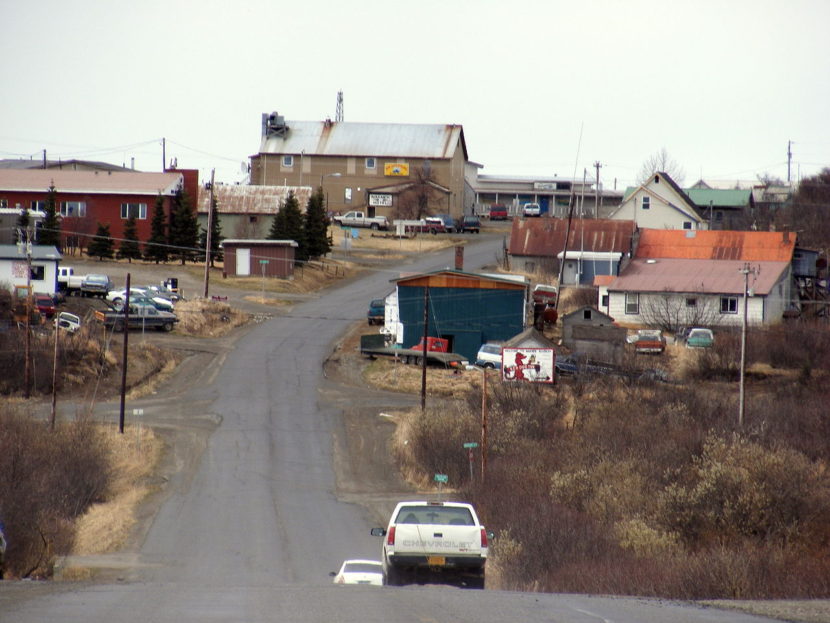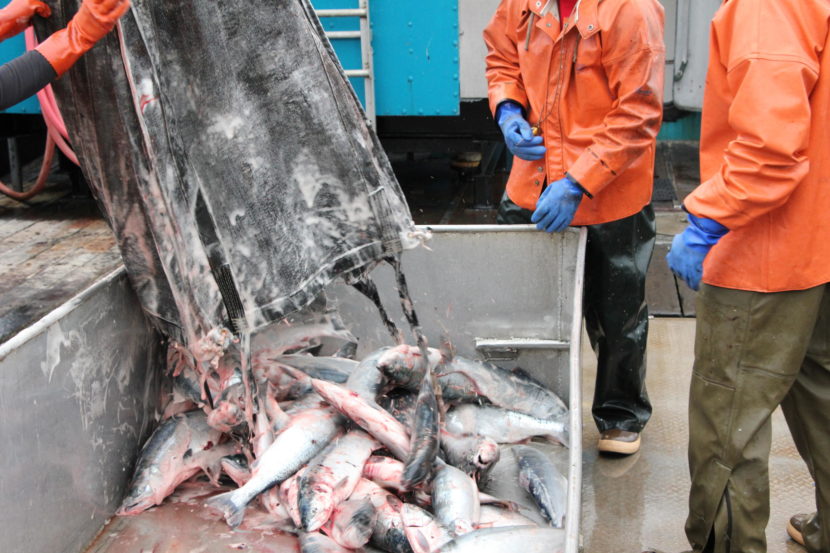
The Naknek Native Village Council, the South Naknek Village Council, and the King Salmon Tribe have joined Dillingham city and tribe in a call for the governor to put extreme protective measures in place or consider closing the world’s most valuable and productive sockeye salmon fishery.
“The Tribal Organizations of Naknek, King Salmon, and South Naknek, consider this pandemic to be of utmost importance. Our people, and our culture are at risk,” the tribes said, adding that they are prepared to take more stringent measures.
Naknek and King Salmon are on the same road system, on the east side of Bristol Bay, with an off-season population of under a thousand residents. Dillingham is to the west, with a population of around 2,300 and a small 16-bed hospital — the only one in the region.
During the summer, processors bring in thousands of employees; thousands of independent fishermen come to the region as well.
In the letters, the groups pointed out that there is no hospital in the Bristol Bay Borough, and extremely limited medical resources and infrastructure. Moving forward with the fishing season goes against all guidance on how to prevent an outbreak.
Lorianne Rawson, the tribal administrator for South Naknek, said that most of the village’s residents are elderly or immunocompromised, and that they needed to protect those people. The community also had historical experience with this, she said. Her own grandfather survived the flu pandemic of 1919.
“When the Spanish flu arrived, it decimated the village, and the remaining survivors then moved to South Naknek. Historically, it has wiped out our people, and we just don’t want it to happen again,” she said.
Rawson is also concerned about the fishermen coming into the region, saying that plans to quarantine in boats weren’t realistic.
“Their boats are in boat yards. Their boats don’t have a bathroom. They have no way to shower, they can’t do laundry, and they can’t go to the store to get their food. So how are they going to effectively quarantine on their boats? That’s not going to happen,” she said.
The Naknek council said much the same in its letter, writing, “There is no way to prevent a potential mass disease situation when processors employ several thousand people, working in close proximity, living in bunk houses, confined to closed campus-style operations. We must consider that a potential mass-outbreak would be disastrous.”
The King Salmon Tribe said that the Bristol Bay Borough is unequipped for a pandemic of this proportion, and calling the borough’s quarantine plan “inadequate.” Joni O’Domin is an administrative assistant for the tribe.
“Our health care system here is way too small. We have to go through Kanakanak or Camai, and they have a two bed emergency room, down at Camai, or trauma room. And it’s just too small here,” she said.
The Bristol Bay Borough Assembly passed an ordinance this week mandating a 14-day self-quarantine for anyone traveling into King Salmon and Naknek, and granting the borough police the authority to enforce it, as well as the six-foot social distancing mandate.
Curyung Tribal Council Second Chief Gayla Hoseth in Dillingham said that the processors’ plans don’t adequately address how they would handle an outbreak.
“That needs to be shown to all the communities before they even come into the area, of what their plan of action is going to be if somebody gets sick. And where are they going to receive their health care, and what is going to be the plan for health care for them,” she said

Meanwhile, the big processors gearing up to operate in Bristol Bay’s salmon fishery this summer have laid out aspects of their safety protocols that they say will allow them to participate safely in the upcoming season amid the coronavirus pandemic.
“We are writing to you to confirm our commitment that we are prioritizing the health and safety of the communities and tribal councils of Bristol Bay,” they wrote in a letter to the region’s communities.
The eleven companies are:
- North Pacific Seafoods
- Alaska General Seafoods
- Trident Seafoods
- Peter Pan Seafoods
- Silver Bay Seafoods
- Icicle Seafoods
- Ocean Beauty Seafoods
- E&E Foods
- Leader Creek Fisheries
- Deep Sea Fisheries
- Copper River Seafoods.
“Honestly, we’re not yet sure how this is all going to shake out,” said Chris Pugmire, the general manager of Icicle Seafoods. He said that the company understands the communities’ position, and that they are in talks with local leaders.
“Our plan is to continue preparing for the season as if it is going to happen, and in so doing, we are and will continue to work with the communities to ensure that every reasonable precaution is being take to protect the health, safety and wellbeing of everyone in Bristol Bay,” he said.
An industry task force has set guidelines for participating seafood companies and other stakeholders to use. The processors say that they will incorporate those guidelines into their individual plans. Seven of the processors have been posted their plans on the Bristol Bay Borough’s website, which range widely in their level of detail.
The companies say in their joint letter that all employees will be verbally screened before being given flight information. Workers will also be medically screened at the Anchorage or Seattle airports, and people won’t be allowed in or out of the processor campuses. Employees arriving from other locations must comply with a 14-day quarantine.
The processors also say that each company has the capacity to isolate and care for employees who develop COVID-19 symptoms.
“We will work closely with Camai Community Health Center to keep employees safely isolated from the community while still ensuring they receive proper medical care,” they write.
Employees will be medically screened before the start of each work shift. Processors say they will also try to keep social distancing measures in place as much as possible: they’ll stagger coffee and meal breaks, ban group gatherings, and limit the number of plant workers that do necessary business with the local community.
They note that their list of precautions is not definitive, and that plans will continue to evolve as the situation changes, and through discussion with communities and tribal councils.
In a press conference Thursday evening, Dunleavy said that the state has a team working to determine whether a fishing season could take place this year. He said that the team was working with local officials, tribal leaders, fishermen and processors.
As of Friday morning no cases of COVID-19 have been reported in the region.